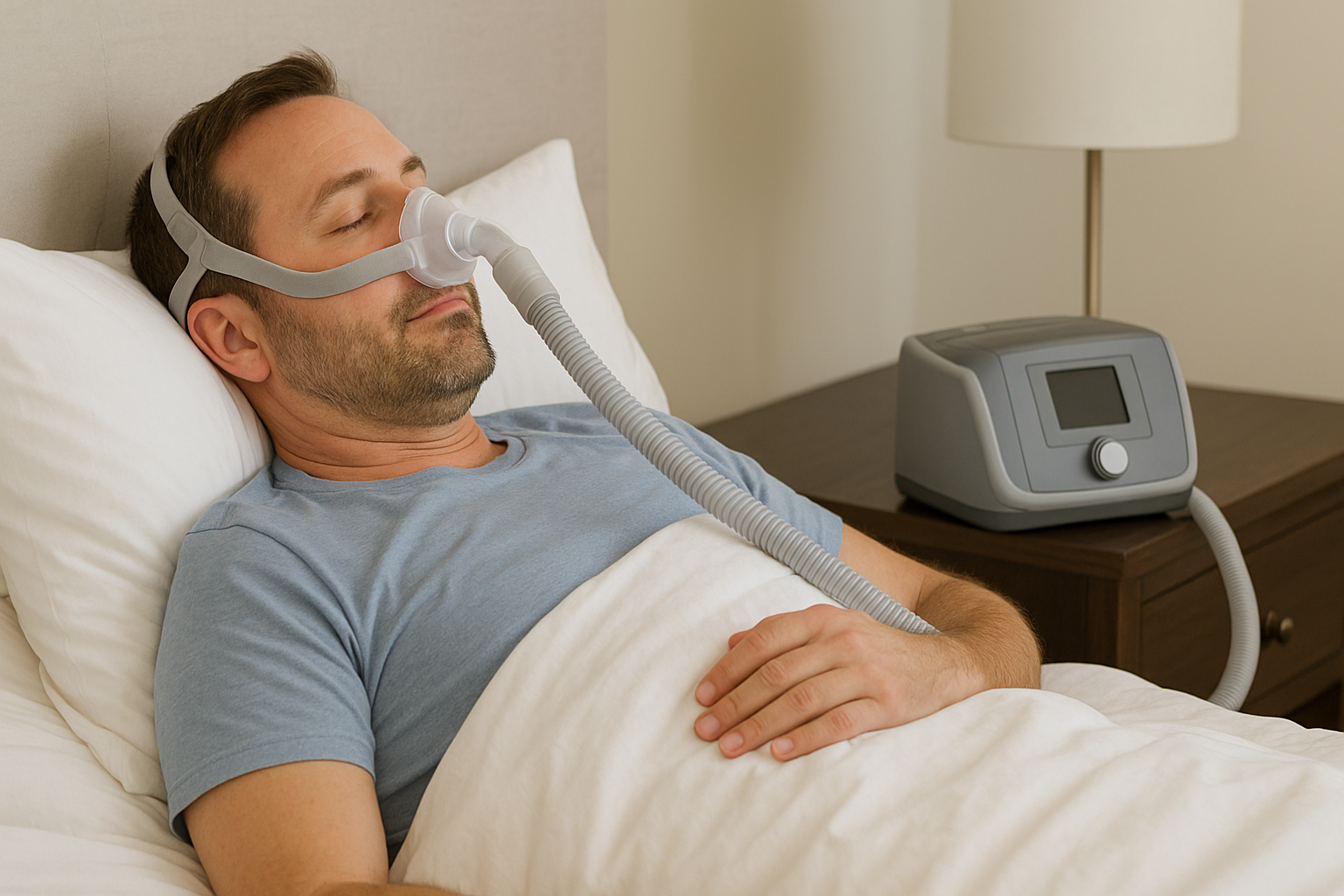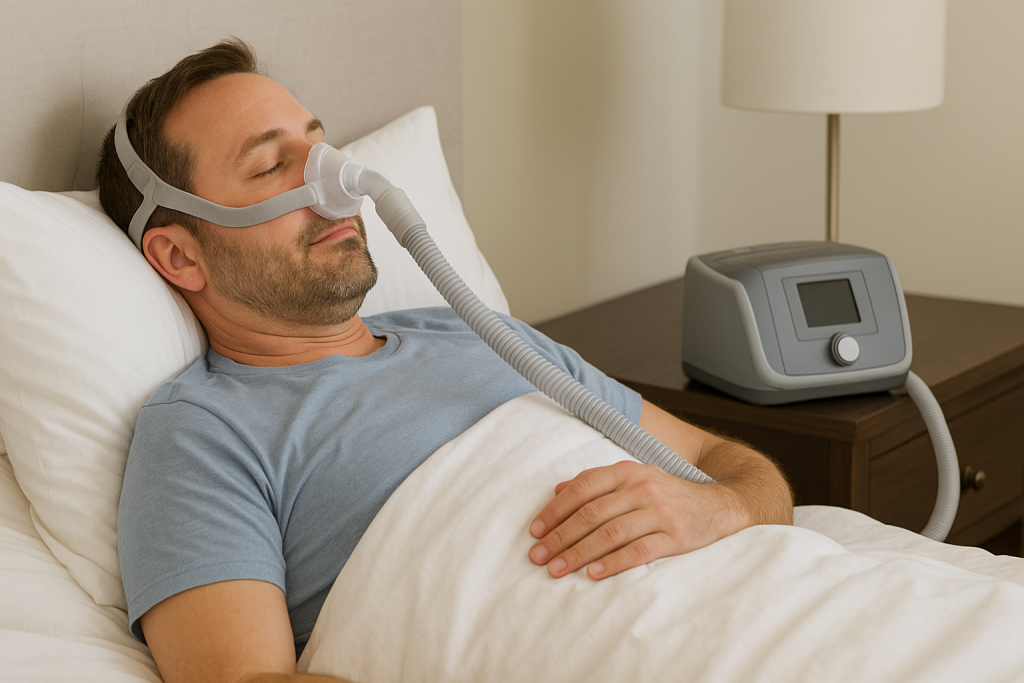CPAP Machine for Sleep: How It Improves Health and Quality of Life


Introduction: The Link Between Sleep and Health
Sleep is one of the body’s most important healing processes. When sleep is consistently interrupted, it takes a toll on nearly every system of the body—from the heart and brain to metabolism and mood. One of the most common culprits of poor sleep is sleep apnea, a condition where breathing repeatedly stops and starts during rest.
For people with sleep apnea, a CPAP Machine for sleep is more than just a device—it’s a vital health tool that restores oxygen flow, improves sleep quality, and prevents life-threatening complications. Let’s dive into how CPAP therapy improves overall health and well-being.
Understanding the CPAP Machine for Sleep
What is a CPAP Machine?
A CPAP (Continuous Positive Airway Pressure) machine delivers a constant stream of pressurized air through a mask. This airflow keeps the airways open, preventing pauses in breathing that characterize sleep apnea.
How CPAP Therapy Works
During normal sleep apnea episodes, oxygen levels in the blood drop, forcing the brain to wake the person up briefly to restart breathing. A CPAP machine prevents these interruptions, ensuring steady oxygen supply throughout the night.
Who Should Use a CPAP Machine?
Doctors typically prescribe CPAP therapy to individuals diagnosed with moderate to severe obstructive sleep apnea (OSA). People who snore loudly, wake up gasping, or experience extreme fatigue during the day may also benefit.
Health Benefits of Using a CPAP Machine for Sleep
Restores Normal Breathing During Sleep
The primary benefit is restoring normal breathing patterns. By preventing airway collapse, CPAP ensures the body gets uninterrupted oxygen, allowing deep, restorative sleep.
Improves Cardiovascular Health
Sleep apnea is strongly linked to heart disease. A CPAP machine reduces strain on the heart by maintaining consistent oxygen levels and preventing nighttime blood pressure spikes.
Reduces Risk of Stroke and Hypertension
Studies show that untreated sleep apnea significantly increases the risk of stroke and high blood pressure. CPAP therapy lowers these risks, making it a powerful tool for long-term health protection.
Supports Diabetes and Metabolic Health
Poor sleep can worsen insulin resistance. Using a CPAP machine improves glucose control, making it especially beneficial for people with type 2 diabetes.
Enhances Brain Function and Mental Clarity
Oxygen deprivation during sleep affects memory, concentration, and decision-making. CPAP users often report sharper focus and better cognitive performance.
Improves Mood and Reduces Depression Risk
Chronic sleep deprivation is linked to depression and anxiety. By promoting quality sleep, CPAP therapy supports mental health and emotional stability.
Boosts Energy and Daytime Productivity
Waking up refreshed leads to more energy, motivation, and overall productivity during the day—one of the most immediate benefits users notice.
Long-Term Health Improvements from CPAP Therapy
Slows Cognitive Decline and Protects Memory
Long-term CPAP use may reduce the risk of dementia and memory loss by protecting the brain from chronic oxygen deprivation.
Lowers Risk of Accidents from Daytime Sleepiness
People with untreated sleep apnea are more likely to fall asleep while driving or at work. CPAP restores alertness, reducing accident risk.
Supports Weight Management Efforts
Better sleep regulates hormones like leptin and ghrelin, which control appetite. This makes it easier for CPAP users to maintain a healthy weight.
Common Challenges of Using CPAP Machines
Mask Discomfort and Leaks
Many new users struggle with the CPAP mask. If it doesn’t fit properly, it can cause air leaks, skin irritation, or pressure marks. Choosing the right mask type—nasal mask, full-face mask, or nasal pillows—helps minimize discomfort.
Dry Mouth and Nasal Congestion
Continuous airflow sometimes causes dryness or nasal blockage. Adding a heated humidifier or saline spray before bedtime can greatly improve comfort.
Difficulty Adjusting to Therapy
At first, sleeping with a CPAP machine may feel strange or restrictive. Most patients need a few weeks to fully adapt. Gradually increasing nightly use and wearing the mask while awake (e.g., watching TV) can ease the transition.
Tips to Maximize Health Benefits of CPAP Use
Daily Cleaning and Maintenance
Cleaning the mask, tubing, and water chamber prevents bacteria buildup and respiratory infections. A simple daily rinse and weekly deep cleaning keep the machine safe and effective.
Building Consistency in Use
CPAP therapy only works when used every night. Even short breaks can reduce its health benefits. Creating a bedtime routine and making CPAP part of it ensures long-term success.
Combining CPAP Therapy with Healthy Lifestyle Habits
- Weight Management: Losing weight may reduce apnea severity.
- Regular Exercise: Improves cardiovascular function and lung health.
- Limiting Alcohol and Smoking: These habits worsen airway obstruction and should be minimized.
When combined with CPAP, these lifestyle changes amplify health improvements.
Alternatives to CPAP Machine for Sleep
Oral Appliances
Dentists can fit special mouthpieces that reposition the jaw to keep the airway open. They are less effective than CPAP but may help mild cases.
Weight Loss and Exercise
Losing excess weight significantly reduces airway obstruction in many patients with sleep apnea.
Surgical Interventions
In severe or unresponsive cases, surgery may remove excess tissue from the throat or reposition airway structures.
⚠️ However, CPAP remains the gold standard for most sleep apnea patients due to its proven effectiveness and safety.
FAQs About CPAP Machine for Sleep and Health
1. How quickly will I notice health benefits after using a CPAP machine?
Many people experience better sleep quality and reduced daytime fatigue within the first week, while cardiovascular and metabolic improvements may take months.
2. Can CPAP machines cure sleep apnea?
No. CPAP therapy doesn’t cure sleep apnea but controls it effectively. Stopping use usually leads to the return of symptoms.
3. Do I need to use my CPAP machine every night?
Yes. Consistency is key to maximizing health benefits. Missing nights reduces treatment effectiveness.
4. Is CPAP therapy safe for long-term use?
Absolutely. CPAP machines are designed for lifelong use if needed, with no harmful side effects when maintained properly.
5. Can CPAP machines help with snoring?
Yes. By keeping the airway open, CPAP significantly reduces or eliminates snoring.
6. Are there travel-friendly CPAP machines?
Yes. Many brands offer compact, lightweight CPAP machines approved by airlines for in-flight use.
Conclusion: CPAP as a Lifesaving Health Tool
A CPAP Machine for sleep is far more than a comfort device—it’s a lifesaving medical tool that restores oxygen flow, prevents dangerous health complications, and dramatically improves quality of life. From protecting heart health to boosting brain function, its benefits touch every aspect of the body.
While initial adjustment may be challenging, consistency and proper maintenance ensure long-term success. For anyone struggling with sleep apnea, CPAP therapy represents one of the most effective steps toward better sleep, better health, and a longer, more vibrant life.
👉 Want to learn more? You can read additional resources on Sleep Foundation for expert guidance.
















